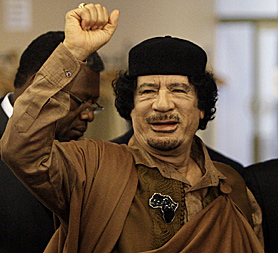Libya uprising: what next for Gaddafi’s regime?
The Libyan government’s extreme use of force threatens to fan the flames of dissent, writes former British Ambassador to Libya, Sir Richard Dalton, for Channel 4 News.

The Libyan leadership’s instinct will be to rely on force to restore calm and their control in places where they have lost it.
But there is a serious possibility that this will merely pour fuel on the flames and spread them to new areas.
This is the most significant home-grown challenge ever to the Libyan system of government and to Colonel Gaddafi’s leadership.
Some in Libya would like to blame the disorder in the East on foreign countries but there is no published evidence of this.
This is the most significant home-grown challenge ever to the Libyan system of government and to Colonel Gaddafi’s leadership.
Rather, many people throughout the country including in the West in and around Tripoli are sick of the suppression of dissent, of the lack of reform, and of the profiteering by some who have power including some of Gaddafi’s sons. They are also now enraged at the large-scale killings of protesters.
It is a political rising – in the sense that politics everywhere is the way to address grievances and in Libya there are deeply felt political, social and economic ones.
The regime slogans “sovereignty of the people” and “direct democracy” lack tangible meaning in people’s lives.
But there is so far no political response from the leadership, apart from minor steps to assure people that money will be spent on housing.
If they wish to stay ahead of demands for change, they must find a way of channelling dissent and talking seriously to opponents about political questions, as have Bahrain and Egypt.
In Libya a genuine dialogue would have to include expression of opinion, constitutional change and corruption. The Revolution and the person of the Leader can no longer be no-go areas.
No one can forecast how the crisis will develop or where it will end. Are the leadership up to the task of dialogue? Will the leadership and the security forces hold together if they increase violent repression? We don’t know.
There might be a new government under a new Prime Minister tasked to carry out reforms.
Continuation of the status quo for a period cannot be ruled out yet.
There could be pressure within the leadership for fundamental change at the top, threatening the Gaddafi family’s position and ushering in a period of transition with an uncertain outcome, as in Egypt.
Continuation of the status quo for a period cannot be ruled out yet. But under any scenario, Libya will not remain for ever outside the trend in the Arab and African worlds towards public debate, political participation, civil rights and democracy.
Sir Richard Dalton was British Ambassador to Libya between 1999-2002 and is now an Associate Fellow at Chatham House
-
Latest news
-
‘I violated my moral compass working for Trump,’ former lawyer testifies3m

-
Working class creatives in film and TV at lowest level in decade5m

-
Israeli police investigating attack on Gaza aid convoy4m

-
Biden announces major tariff increase on Chinese-imported green tech3m

-
‘If NHS can afford it, people with obesity should have Semaglutide,’ says weight loss expert5m

-




